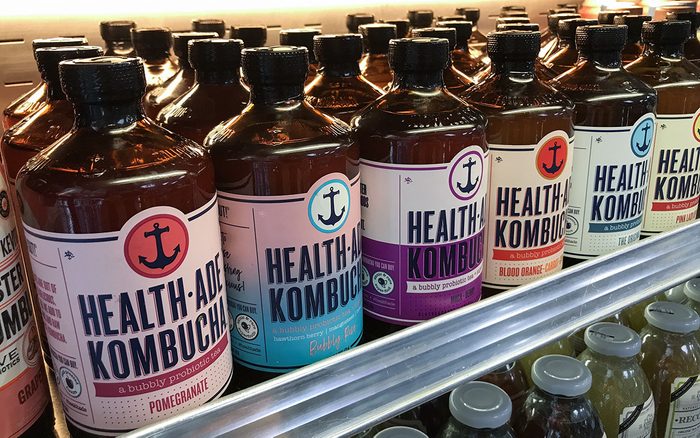What Is Kombucha?
Updated: May 17, 2024

What is kombucha? It's a bubbly, probiotic beverage that's popping up everywhere.
The fermented tea drink kombucha has become a staple in health food stores and at farmers markets over the years. Now, “booch” is available just about anywhere. It’s a health trend that is here to stay!
On This Page
What Is Kombucha?
Kombucha is a fermented tea drink made by placing a mixture of bacteria and yeast into sweetened black or green tea. A glassful of bacteria doesn’t exactly sound appetizing but that is where kombucha gets its nutritious punch. “The bacteria and yeast digest the sweetened tea and produce byproducts like acetic acid (as well as other healthful acids) in the process,” says Willow Jarosh, MS, RD and resident nutritionist at Health-Ade (one of the best kombucha brands we’ve tried.)
The bacteria and yeast mixture is called a symbiotic colony of bacteria and yeast (SCOBY for short) and sits in the tea for a couple of weeks before the kombucha is ready. What’s left is a slightly sweet, slightly tart bubbly tea.
Is Kombucha Good for You?
Kombucha can be a healthy part of your diet but much of the hype has yet to be proven. This tart tea drink is rich in B vitamins, antioxidants and probiotics which may benefit your health. Without large studies, it’s hard to say if kombucha is definitely good for you.
The Centers for Disease Control and Prevention recommend limiting your kombucha consumption to 12 ounces per day. That is less than the 16 ounces that usually come in a single bottle.
Kombucha Health Benefits
The benefits of drinking kombucha are still being studied but seem promising. Kombucha is rich in polyphenols, powerful antioxidants that help to reduce inflammation in the body.
Because kombucha is fermented, it offers the same health benefits as other fermented foods like yogurt and sauerkraut. The bacteria and yeast in kombucha contain probiotics to improve our gut health. “This mixture of many different strains of critters can help balance our gut bacteria if it’s lacking or out of balance,” says Willow.
The acids produced by the fermentation process may have antimicrobial and antibacterial properties, as well as a positive impact on blood sugar levels after eating. These benefits are still being studied.
Drinking kombucha is a tasty way to stay hydrated too. If you have ever struggled to drink enough water throughout the day, Willow recommends adding a splash or two of kombucha to still or sparkling water for a hit of flavor.
While rare, there are a few side effects to keep in mind. According to experts at the Cleveland Clinic, drinking too much kombucha can lead to headaches, nausea and stomach upset. Use caution when drinking home-fermented kombucha, as contamination is possible. “Because we’re depending on specific bacteria and yeast being in a delicate balance with one another,” explains Willow, “anything that could break that balance could create an unsafe product.” Kombucha is not a safe choice for pregnant women, children or those with compromised immune systems.
Ready to try this bubbly beverage? Look for a professional brand that has the proper safety procedures in place. (Locally-fermented varieties at the farmers market look lovely but there is no way to know if it’s safe.) Then all you need to do is choose your favorite flavor and start sipping!
